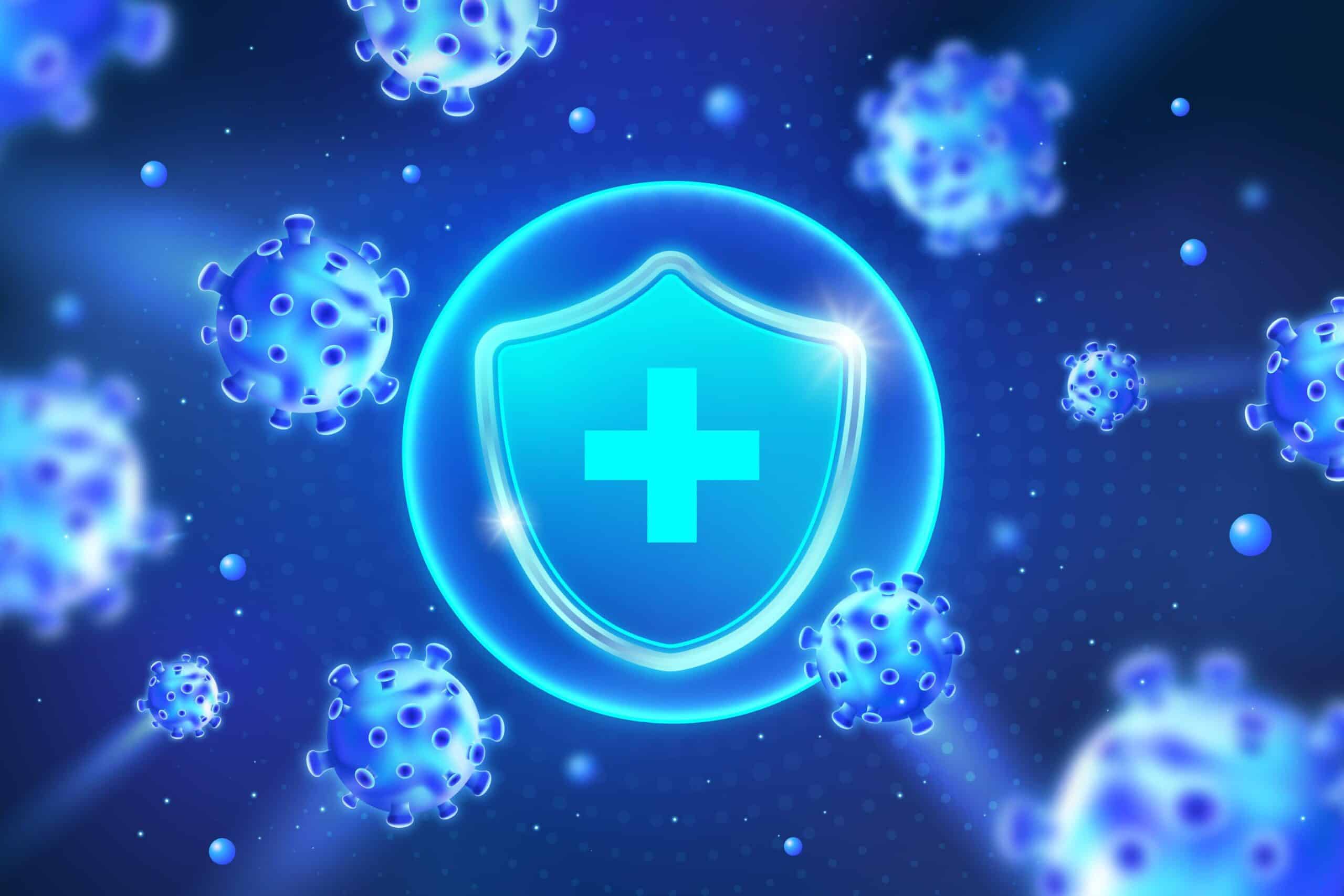Selenium for Immune Function

If you’re wondering why some people rarely get sick, the secret might lie within a tiny but mighty mineral. Selenium, an essential nutrient in our diet, is key to maintaining robust immune health.
This article delves into the critical role selenium plays in supporting your body’s defense system and how it can potentially shield you from illness. Discover the power of this mineral for staying healthy!
Key Takeaways
- Selenium is important for our immune system because it helps make selenoproteins, which protect our body from getting sick.
- This mineral can help fight off viruses and other germs. Not having enough selenium might make you get sick more often.
- Taking extra selenium could be good for older people or those with certain health problems like cystic fibrosis to help their bodies stay strong against diseases.
- Some studies say that selenium might lower the chance of getting some kinds of cancer, but too much could also be risky.
- Doctors and scientists are still learning about how selenium works in our body and how it can keep us healthy as we age.
The Relationship Between Selenium and Immune Cells

Selenium plays a crucial role in immune function, particularly in the activation and regulation of immune cells. This mineral is incorporated into selenoproteins, which are essential for the proper functioning of immune cells and their response to pathogens.
Incorporation of Dietary Selenium into Selenoproteins
Our bodies use the selenium we eat to make special proteins called selenoproteins. These proteins are superheroes for our immune systems. They help calm inflammation and ensure our white blood cells, which fight germs, work the way they should.
When you get enough selenium from foods like nuts or seafood, your body can better handle harmful bugs and heal faster. It also helps keep your thyroid working right, which is important because it controls much of what happens in your body.
Without enough selenium, our defense system might not do its job well, making it harder to stay healthy.
Selenoprotein Functions
Selenoproteins are a group of proteins that include selenium. They help control how your body works differently, especially for your immune system. These proteins make sure that your immune cells stay healthy and work right to fight off germs.
Selenoproteins also stop too much inflammation, which can harm the body.
Your body uses these selenoproteins to guard against damage caused by bad stuff called free radicals. This is important because if free radicals build up, they can hurt cells and lead to sickness.
Think of selenoprotein as a superhero team inside you, keeping everything balanced and safe so you stay healthy!
Selenoprotein Expression in Immune Cells
Selenium plays a big part in how our immune cells work. It helps make special proteins called selenoproteins that exist in these cells. These proteins are superheroes for the body’s defense system, fighting to keep you healthy.
They work by protecting immune cells from damage and helping them do their job right.
In older people, or when someone doesn’t have enough selenium, their immune cell function can drop. But research shows that if these folks get more selenium into their bodies, it could bring those important defender cells back up to speed.
This means better protection against sickness and staying healthier as we age.
Selenium and Redox Signaling
Selenium, an essential mineral, plays a critical role in redox signaling within the body. It regulates inflammation and immune responses through its incorporation into selenoproteins.
These selenoproteins act as antioxidants, helping to balance oxidative stress within cells and tissues. Furthermore, selenium’s influence on redox signaling impacts various cellular functions, including immunity and inflammatory processes.
Incorporating dietary selenium into selenoproteins allows for the modulation of redox-sensitive signaling pathways crucial for immune cell activation and function. By contributing to redox homeostasis, selenium helps regulate immune cell proliferation and activity, ultimately influencing the body’s ability to mount effective immune responses against pathogens while also controlling excessive inflammation.
Effects on Immune Cell Effector Functions
Selenium plays a crucial role in regulating the function of immune cells. It affects the activation and proliferation of lymphocytes, which are essential for mounting an effective immune response against pathogens.
Additionally, selenium influences the production of cytokines by immune cells, aiding in communication between different components of the immune system. Furthermore, selenium enhances the activity of natural killer (NK) cells, vital for targeting infected or abnormal cells within the body.
The influence of selenium on immune cell effector functions also extends to macrophages and dendritic cells. These cells play pivotal roles in recognizing and engulfing pathogens and initiating adaptive immunity through antigen presentation.
Selenium’s Impact on Human Health and Disease

Selenium is critical in human health, impacting various immune function and disease prevention aspects. Its effects are observed in viral infections, non-viral pathogens, allergies, asthma, cancer, and the aging immune system.
Viral Infections
Research suggests that selenium is crucial in preventing and managing viral infections. Selenium deficiency can increase oxidative stress and mutations, making the body more susceptible to viral invaders.
In addition, selenium supplementation has been found to influence macrophage responses, enhancing the immune system’s ability to fight viruses effectively. This mineral is closely linked with inflammation, immune response, and maintaining redox homeostasis – vital in combatting viral infections.
Moreover, selenium is known for its antioxidant properties, which are essential for defending against viruses and supporting overall immune function.
In the context of viral infections, it’s important to note that selenium is fundamental in providing antioxidant defense and maintaining redox homeostasis within the body. Studies have shown that adequate selenium is crucial in preventing viral mutations and reducing oxidative stress induced by viral infections.
Non-viral Pathogens
Selenium plays a crucial role in the immune response against non-viral pathogens, such as bacteria and parasites. Research has shown that selenium deficiency is associated with an increased susceptibility to these infections, potentially impacting disease severity and progression.
Furthermore, maintaining adequate selenium levels may help fortify the body’s defenses against non-viral pathogens, contributing to overall health and well-being.
Adequate selenium intake has been linked to improved immune function, which can aid in combating non-viral pathogens and reducing the risk of related diseases. Studies have suggested that supplementing with selenium may enhance the body’s immune response against various non-viral pathogens, highlighting the important role of this essential mineral in supporting optimal immune system function and overall health.
Allergies and Asthma
Low blood levels of selenium are common in people with asthma. Some studies suggest that taking selenium supplements might be helpful for those with asthma. However, the relationship between selenium intake and allergic asthma is unclear.
Research on the impact of selenium on allergies and asthma has led to mixed results, making it a complex topic.
It’s important to note that the connection between selenium and asthma is still being studied, and conclusive findings have not been reached. Therefore, if you have allergies or asthma, you must consult a healthcare professional before considering any changes to your diet or supplementation routine involving selenium.
Cancer
Selenium plays a significant role in cancer. Studies suggest that increased selenium intake may be linked to decreased cancer risk, but caution is necessary as some research has shown selenium’s potential to promote tumors.
Selenium’s anti-cancer effects are attributed to its ability to reduce DNA damage and oxidative stress, boost the immune system, and destroy cancer cells.
The relationship between selenium and cancer is complex – it offers potential protective benefits against certain cancers while posing risks in other scenarios. This underscores the importance of maintaining a balanced approach when considering selenium’s role in cancer prevention and treatment.
Aging Immune System
As we age, our immune system undergoes changes that may impact its effectiveness in fighting infections and diseases. Studies have shown that adequate levels of selenium are necessary for proper immune function, and increased blood levels of selenium are associated with an enhanced immune response.
Recent research suggests that selenium has anti-aging properties and may protect against age-associated diseases, supporting its influence on immune responses involving aging immunity.
Selenium plays a key role in the innate immune system as it influences the body’s ability to ward off infections and maintain overall health. With aging, maintaining optimal levels of selenium becomes increasingly important for sustaining a robust immune system and reducing susceptibility to age-related illnesses.
Potential Benefits of Selenium Supplementation
Selenium supplementation has shown potential benefits in boosting anti-viral immunity, addressing critical illness stress-induced immune suppression, managing systemic inflammatory response syndrome, supporting cystic fibrosis treatment, and targeting autoimmune conditions.
These benefits highlight the importance of selenium in optimizing immune function and overall health.
Boosting Anti-viral Immunity
Research suggests that selenium is crucial in enhancing the body’s ability to fight off viral infections. Adequate selenium levels have been linked to improved anti-viral immunity, potentially impacting the body’s defense mechanisms against infectious viruses.
Studies indicate that selenium deficiency may lead to decreased immune defenses against viruses such as COVID-19, highlighting the significance of maintaining optimal selenium status for bolstering the body’s ability to combat viral pathogens effectively.
Selenium supplementation has shown promising potential in boosting anti-viral immunity, indicating its relevance in promoting overall immune health and resilience against viral infections.
Critical Illness Stress-induced Immune Suppression
Selenium supplementation has proven beneficial in critically ill individuals with sepsis, showcasing the intricate nature of immune function. Studies have shown that selenium-containing supplements effectively block cytokine-induced upregulation of NF-κB and iNOS, which reduces stress-related immune suppression.
This emphasizes the potential impact of selenium on enhancing immune response during critical illness. Moreover, selenium has been found to increase cellular immune response in individuals with low plasma selenium, underlining its role in mitigating critical illness stress-induced immune suppression.
Selenium supplementation offers promising avenues for bolstering the body’s defense mechanisms during severe health challenges by actively targeting critical illness stress-induced immune suppression.
Systemic Inflammatory Response Syndrome
Systemic Inflammatory Response Syndrome (SIRS) can result from severe infections, burns, or trauma. It involves a widespread inflammation that affects the entire body. SIRS can lead to organ dysfunction and even failure.
Selenium plays a crucial role in modulating this systemic inflammation by regulating the immune response and reducing oxidative stress. Adequate selenium levels have been associated with improved outcomes in critically ill patients.
In cases of SIRS, low selenium levels are often observed, contributing to increased inflammation
and poor immune function. Supplementing with selenium has shown the potential to mitigate the inflammatory response and support immune function during systemic inflammation.
Cystic Fibrosis
Cystic fibrosis has been linked to a potential deficiency in the essential mineral selenium. Adequate levels of selenium are crucial for regulating and initiating immunity and managing chronic inflammation.
Therefore, maintaining optimal selenium levels is particularly important for individuals with cystic fibrosis to support their immune function and mitigate chronic inflammatory processes associated with this condition.
Selenium is vital to the body’s overall health by impacting immune function. Individuals with cystic fibrosis would benefit from paying attention to their selenium levels due to their influence on immunity and inflammation regulation.
Autoimmunity
Selenium plays a crucial role in the functioning of the immune system, especially concerning autoimmunity. Research suggests that selenium deficiency is associated with sub-optimal thyroid function and is a risk factor for autoimmune thyroid diseases such as Hashimoto’s thyroiditis and Graves’ disease.
Supplementation of selenium in patients with autoimmune thyroiditis has been linked to reduced levels of anti-thyroperoxidase antibody, highlighting its potential in managing autoimmunity.
In addition, selenium supplementation may aid in decreasing antithyroperoxidase antibody levels and improving thyroid ultrasound in individuals with Hashimoto’s thyroiditis. This underlines the significance of selenium in addressing autoimmune conditions by potentially modulating immune responses.
Targeting Immune System Supplementation
Boosting immune system health through targeted supplementation can be crucial for maintaining overall well-being. Adequate selenium intake has enhanced the immune response and reduced the risk of certain pathologies. To target immune system supplementation effectively, consider the following:
- Enhancing Anti-viral Immunity: Selenium supplementation has shown potential in boosting the body’s defense against viral infections, contributing to overall immune resilience.
- Managing Critical Illness Stress-induced Immune Suppression: In cases of critical illness, targeted selenium supplementation may help mitigate stress-induced immune suppression, supporting better recovery outcomes.
- Addressing Systemic Inflammatory Response Syndrome: Selenium supplementation has been linked to modulating excessive inflammation and managing systemic inflammatory response syndrome.
- Supporting Conditions like Cystic Fibrosis: Research suggests that selenium supplementation could benefit individuals with cystic fibrosis by enhancing their immune function and overall health status.
- Managing Autoimmunity: Targeted selenium supplementation may play a role in supporting the management of autoimmune conditions by regulating immune responses and reducing inflammatory processes.
The Future of Selenium Research
Future selenium research will likely focus on its role in managing chronic inflammation and enhancing immune system health. Studies may explore the potential benefits of selenium supplementation in improving humoral and cell-mediated immune responses.
Additionally, research interest might be directed toward understanding the role of selenium in maintaining immune system performance, particularly during pregnancy. Future investigations could also involve exploring the potential of selenium in lowering oxidative stress and supporting immune function and its impact on overall health.
Overall, future studies are expected to further our understanding of how selenium can play a crucial role in bolstering the body’s defense mechanisms and potentially aiding in combating various health challenges linked to immunity, such as chronic inflammation and age-related decline.
FAQs
Q: What is selenium, and what is its role in immune function?
A: Selenium is an essential mineral that plays a crucial role in immune function. It acts as an antioxidant and supports the body’s defense against oxidative stress.
Q: What are the sources of selenium?
A: Selenium can be found in various foods such as seafood, meat, poultry, eggs, and Brazil nuts. It can also be obtained from supplements and fortified food products.
Q: How does selenium intake affect immune function?
A: Adequate selenium intake is associated with a healthy immune response. It may help produce certain enzymes and proteins that contribute to immune function.
Q: What is the relationship between selenium and thyroid health?
A: Selenium plays a role in thyroid health by supporting the function of the thyroid gland. It contributes to converting thyroid hormones and helps maintain optimal thyroid function.
Q: Can selenium deficiency impact immune function?
A: Although selenium deficiency is rare in well-nourished populations, it can harm immune function. Insufficient selenium levels may compromise the body’s immune response.
Q: Are there health benefits associated with selenium supplementation?
A: Supplementing with selenium may provide benefits for overall health and nutrition. However, it’s essential to consult a healthcare professional before starting any supplementation regimen.
Q: What are the recommended doses of selenium for immune support?
A: The recommended daily intake of selenium varies by age and gender. For adults, the recommended dietary allowance is 55 micrograms per day.
Q: Is there a link between selenium and selenoproteins in the body?
A: Selenium is crucial for synthesizing selenoproteins, which are important for various biological functions, including antioxidant defense and immune regulation.
Q: How is serum selenium concentration measured?
A: Serum selenium concentration can be measured through blood tests. This helps assess an individual’s selenium status and determine if supplementation may be necessary.
Q: Are zinc and selenium related in terms of immune function?
A: Both zinc and selenium play roles in supporting immune function. They may work synergistically to help the body maintain a healthy immune response.

